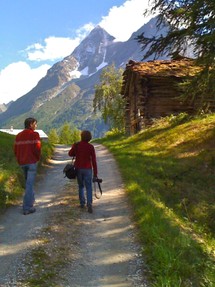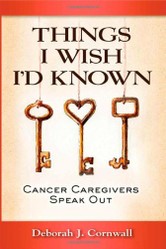My interest in a cure for cancer has always been intense. Maybe it was spurred by fears of the horrors the disease visited on patients in hospitals where I worked and heightened more by my own longtime habit of smoking.
It persisted after I quit, became a less personal interest, and the stories of researchers efforts to even clearly identify, let alone cure, the variety of cancers being discovered were fascinating.
Like most, I've watched friends and loved ones be consumed by the slow wasting of the disease and wondered about the strength of both as a tug of war gradually was lost with a death. But what stuck in my mind were the inexplicable cures, better known as spontaneous remission or spontaneous healing.
These undeniably happened. I remember Deepak Chopra sharing the puzzle of a woman diagnosed with terminal cancer and being told she had six months to live. Six months later, without medical treatment, she was fully healed. She credited her daily practice of visualizing herself cured, her tumor melting.
There is no way to know if visualization actually lead to healing, and even if it did, nobody has any concrete proof of why. The same practice has failed in many other cases.
Setting aside the question of why visualization might work for some and not for others, the important takeaway from this is the proof that spontaneous remissions happen at all. That's where our research needs to begin.
It's being possible makes its secrets the most important ones in personal health. But don't count on the medical establishment or the big pharmaceutical companies to start looking. There is no money for them to make when you cure yourself; so, the best discoveries are likely to be accidental or the result of openminded pioneers eager to take the challenge of what would seem a miracle cure.


 I got a lucky break with some insight on this question at the most unlikely time. On vacation in the Swiss Alps, my wife and I found ourselves in the company of four biologists. One was involved in direct human research while the others were more involved with lab work and teaching.
I got a lucky break with some insight on this question at the most unlikely time. On vacation in the Swiss Alps, my wife and I found ourselves in the company of four biologists. One was involved in direct human research while the others were more involved with lab work and teaching.







 Law of Attraction - Abraham-Hicks' Money Treeon 03/04/2015
Law of Attraction - Abraham-Hicks' Money Treeon 03/04/2015
 Happy and Healthy in One Houron 12/11/2014
Happy and Healthy in One Houron 12/11/2014
 Laura Rankin - Illustrator and Writer of Children's Bookson 08/22/2014
Laura Rankin - Illustrator and Writer of Children's Bookson 08/22/2014
 Eugene Atget Photographyon 06/06/2013
Eugene Atget Photographyon 06/06/2013



What do you think?
I came back to this article thanks to Katie's comment, and this time around found the video on epigenetics, which I believe was not here before. It answered several of my questions. Thank you so much for including it! As for visualization, I'm completely at a loss as to how it should be done. I'll look into it some more.
WOW an outstanding wealth of information. I practice building new pathways in my brain by learning new things, thinking positive and visualizing healing, the birth of new cells throughout my entire body, healthy cells that is. I also work to maintain a healthy microbiome, I make and enjoy kombucha, my favorite is with ginger a nice anti-inflammatory. Inflammation is a big problem adding to the list of things we should address for optimal health. This is an article I will need to read over and refer to often. Great article!
This is really thought provoking, especially since my sister died of cancer a few years ago. While I know there are things that happen to our body that are out of our control, I believe that what ones mindset is plays a significant role. I've seen where people either accept the fact they have cancer or just figure they're going to die anyway. It's important to be positive when you're ill.
Thanks for sharing these ideas, Davestone13. Mysteries abound!
frankbeswick, I agree. There seems to be a strong wave of increasing awareness, like we're emerging from a spiritual dark ages. What seemed fantastic five years ago will be common knowledge. I believe we'll all be better for it.
Thanks for your thoughtful comment.
It is becoming increasingly clear that the world is not as people have thought it was, and that consciousness, rather than being an embarrassing epiphenomenon that materialism cannot explain and tried to explain away, is a fundamental player in reality and has effects in the real world. Hence I am convinced that visualization has a strong, but as yet unexplained role in healing.
Quick suggestion, Katie - check out Anita Moorjani's "Dying To Be Me." Some intriguing reflections on how her cancer led to an NDE and a fast and complete cure that followed.
Very interesting, both the mind and cell regeneration are very powerful proof of the destruction of cancer cells. I too have been intrigued with cancer for multiple reasons. I also feel the determination to live or the willingness to pass is a powerful component in the solution to disease and cancer. All very thought provoking and yet packed with practical evidence. I hung on your every word, well done and much appreciated.
Note: I'm going to forever more imagine any and all cancer cells in my body being wiped out in the next wave of cell regeneration.
Mira, all questions studies are trying to answer. What stumps the field and is rarely acknowledged is that, for all the investment so far, there has been no substantial progress in finding cures for cancer. It's only my opinion, but I think the message there is that they are looking in the wrong places and unwilling, as with cigarette smoking, unwilling to accept some obvious implications about what's being done for profit.
That aside, from my own reading of epigenetics (Understand, it's still a new field of research.), its name says it best. That is epi (above) genetics, the study of what factors influence the constant biological actions in our genes but are outside them. Bruce Lipton, who has been denounced as a quack, makes a fair description of what he thinks happens as proteins signal out genes to do or not do things. Where he gets into trouble is when he overreaches to draw New Age ideas, without sufficient research, into the picture.
Last I read, some big research projects were being funded to consider epigenetics from a broad range with enough results to draw scientifically acceptable conclusions. It is though, as I mentioned, a very new field and probably not ready to yield comprehensive results for a long time. What we've seen so far is promising, though, if inconclusive.
I'd be curious how you understand epigenetics. You didn't expand on it. I believe the scientific community agrees now that gene expression in one individual is not heritable (in any way, as in giving more of a propensity), but what if they later discover that the environmental factors that affected the parents somehow have an impact, for better or worse, on the children?